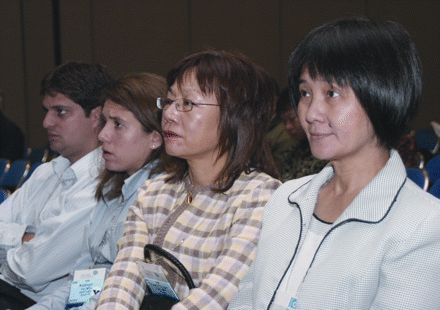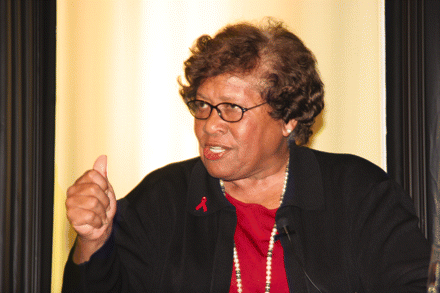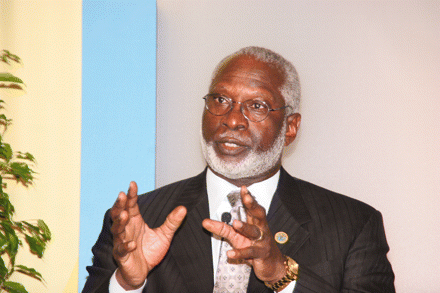Public health workers can join together to dramatically improve health around the world, according to speakers at APHA’s 136th Annual Meeting, who underscored that now is the time to work for better health access both in the United States and globally.
More than 12,600 public health workers came together in San Diego Oct. 21–25 for APHA’s Annual Meeting, which focused on “Public Health Without Borders.” The theme of this year’s meeting was a particularly topical one, according to Sir Michael Marmot, PhD, MPH, MBBS, FRCP, FFPHM, FMedSci, because of the continuing inequalities that occur both within and between countries. Before a crowd of 6,000 at the meeting’s opening session, Marmot called on leaders to make investments in health and ensure that there is health access for everyone, regardless of where they live.

Sir Michael Marmot
“It has to be the right thing to do to construct a health care system that has universal access regardless of an ability to pay,” Marmot said to applause.
Drawing on data from an August World Health Organization report, “Closing the Gap in a Generation: Health Equity Through Action on the Social Determinants of Health,” Marmot detailed the stark differences in life expectancies not just between developed and developing countries, but within nations themselves.

A visitor checks out the booth of the APHA Black Caucus of Health Workers at the expo.
In Washington, D.C., for example, a black man can expect to live to just 63 years of age, while a few miles away, in Montgomery County, Md., a white man can expect to live to age 80, noted Marmot, who is chair of WHO’s Commission on Social Determinants of Health. Almost 900,000 lives could have been saved between 1991 and 2000 if the mortality rates between white and black Americans were equalized, he said, noting that such investments can be cost-effective.
Marmot pointed to the success of a project in slums in India that cost only $500 a household, yet led to a decline in waterborne diseases, an increase in school attendance and better employment for women. Such advances have potential worldwide, he said, contrasting the amount spent on health inequalities to that spent on the war in Iraq.
“Please don’t tell me we don’t have the money,” Marmot said. “We have the money. We choose to use it in particular ways.”
The Annual Meeting’s global theme continued throughout the five-day event with a lineup of world health leaders, such as Ching-chuan Yeh, MD, MPH, Taiwan’s health minister. Speaking at the opening session, Yeh underscored that “local health is global health,” pointing to the recent melamine-contaminated milk crisis in China as an example. While the problem may have started locally, with producers in China illegally adding the ingredient to their milk supplies, the milk was sold in products well beyond the country’s borders, quickly spreading the threat around the globe. Such health risks show that “it is vital to have a transparent global health system,” Yeh said.

Ching-chuan Yeh, Taiwan's health minister, was one of the opening session speakers.
Linda Degutis, DrPH, APHA’s outgoing president, set the tone for the meeting by rallying opening session attendees, calling on them to harness their energy “and direct it toward change.” Degutis lauded the accomplishments of public health — such as seat belts, food safety and water quality — and challenged public health workers to be vocal about their effect on health and their local communities.

Meeting attendees take in one of the hundreds of sessions.
All photos these two pages courtesy EZ Event Photography
“We’re too quiet and too modest about what we do and how effective we are,” she said, noting that “well-behaved advocates rarely make history.”

APHA Annual Meeting attendees line up to meet former Surgeon General Richard Carmona after the Oct. 29 closing session.
Photos courtesy EZ Event Photography
Public health workers also need to speak out on the importance of science-based health decisions, according to three former U.S. surgeons general who closed the Annual Meeting on Oct. 29 (see box, left). Richard Carmona, MD, MPH, FACS; Joycelyn Elders, MD; and David Satcher, MD, PhD, shared stories from each of their tenures as the nation’s top doctors, highlighting their struggles to convey science-based health information — on sexual health, global health and health in prisons, among other topics — to the public in the face of political pressure. Carmona urged audience members to support legislation in Congress that would protect the surgeon general’s office from political interference, “so that the surgeon general never has to fear for their career for telling you the truth.”
With the U.S. presidential election then just days away, America’s health policies were a reoccurring topic during the Annual Meeting. Sessions focusing on health reform were a popular draw, including an APHA town hall that brought together national leaders on the issue. With 45.7 million uninsured Americans, rising obesity and growing health care costs, “the crisis is urgent, and it is now,” said Susan Brink, a former Los Angeles Times reporter who moderated the town hall.

The Annual Meeting Public Health Expo beckons visitors.
Reforming the U.S. health system will take time and require both a social movement and policy changes, said Julie Gerberding, MD, MPH, director of the Centers for Disease Control and Prevention, who spoke at the town hall. To have a real impact, policy changes must be made not just directly in the health sector, but system-wide in health-related arenas such as transportation, housing, education and agriculture, she said.
“If we don’t do something about health status in this country, our children are going to have shorter life spans than we do,” Gerberding said.
For true health system reform to succeed in the United States, the country will need presidential leadership, congressional cooperation, stakeholder buy-in and, importantly, public demand, said Cheryl Matheis, senior vice president for health strategy at AARP, who spoke at the town hall on behalf of the Divided We Fail campaign. Before the November elections, more than 1 million Americans had signed the campaign’s pledge to vote for candidates who would “ensure that all Americans have access to affordable, quality health care.”

CDC Director Julie Gerberding, left, and Peggy Hamburg, a health advisor with the Obama for America campaign, speak on health reform at an Annual Meeting town hall session.
“If you don’t have public demand for reform, the legislators aren’t going to move,” Matheis said. “If people don’t demand it, it won’t happen.”
Providing universal coverage for all Americans was a common theme during the Annual Meeting, with many advocates hopeful that such a policy would be addressed under the next U.S. presidential administration. While the election was still to be decided at the time, polls showed “that most Americans think that if you’re sick, you deserve care,” according to Linda Rae Murray, MD, MPH, APHA Executive Board member, who spoke at a session on health access.
“If we back up and just speak in plain English to people in this country, we should be able to pass…real health reform in this country that includes single-payer as the basement and builds on top of that,” Murray said.
To keep the dialogue moving on health reform, APHA’s National Public Health Week 2009 will focus on “Building the Foundation for a Healthy America.” The annual public health observance will focus on rebuilding the nation’s public health system and ensuring that preventing disease and promoting health are the foundations of reform. Hundreds of communities nationwide will rally around the theme during the week, to be observed April 6–12. (See Page 4.)
Even if they weren’t able to attend the APHA Annual Meeting this year, public health professionals can still become involved, thanks to online offerings from APHA. For the second year in a row, APHA’s Annual Meeting blog posted updates throughout the meeting, covering a range of activities and events. (See Page 27.) The blog entries can be read online now at http://aphaannualmeeting.blogspot.com and comments are welcome.

Omar Khan, MD, MHS, and Michael Marmot, who worked on a new APHA book on global health, sign copies at the meeting.
More news coverage from the Annual Meeting can be accessed via the Medscape Web site, covering topics such as breastfeeding, nutrition and colorectal cancer screening. Two of the Medscape articles, on lung cancer screening and prematurity and maternal blood lead levels, are eligible for free continuing medical education credits. For more, visit www.medscape.com/viewprogram/17562.
More than 1,000 photos taken during the Annual Meeting by a professional photographer are online now and can be browsed or purchased. The photos include those taken at major events such as the opening session and APHA Awards Ceremony as well as socials and scientific sessions. (See Page 5.)
The 2009 APHA Annual Meeting, which will have a theme of “Water and Public Health: The 21st Century Challenge,” will be held Nov. 7–11 in Philadelphia. The process for submitting abstracts for presentation at the 2009 meeting is now under way (see Page 5).
For more on APHA’s past and future Annual Meetings, visit www.apha.org/meetings.
Trio of U.S. surgeons general a meeting favorite
The appearance of three former U.S. surgeons general attracted more than 700 public health professionals to the closing session of APHA’s 136th Annual Meeting in October.
Speaking before a standing room-only crowd in the San Diego Convention Center, Surgeons General Richard Carmona, MD, MPH, FACS; Joycelyn Elders, MD; and David Satcher, MD, PhD, spoke to the enthusiastic crowd for more than two hours, covering everything from their advice to the next surgeon general to their reflections on the best and most frustrating times of their own tenures. A theme that ran throughout much of the session was the danger of allowing politics to interfere with public health science and policy. All three surgeons general spoke frankly of their times in office when political considerations derailed or muted important public health efforts.
former Surgeons General Elders, Satcher and Carmona
Health system reform as well as hopes for the next presidential administration also took center stage during the session, with Satcher calling for more support of prevention and health promotion efforts and Carmona urging that there be a bigger focus on heading off chronic disease.
The three physicians also had much advice for the next surgeon general: Elders advised she or he always have clarity of vision, Satcher reminded the next officeholder to carry on the “baton” of past accomplishments, and Carmona stressed the need to speak up for the science, noting that the surgeon general represents the people’s interests, not those of a particular political party. Carmona also called on the next surgeon general to embrace a lifelong commitment to the office, adding that Americans often view the surgeon general’s office as one of the most credible in the federal government.
“Once a surgeon general, always a surgeon general,” Carmona said.
— Kim Krisberg
- Copyright The Nation’s Health, American Public Health Association











